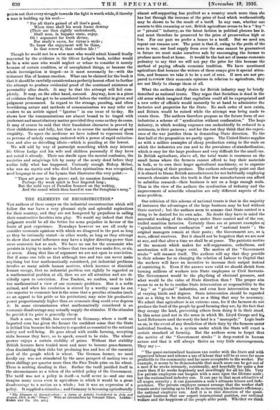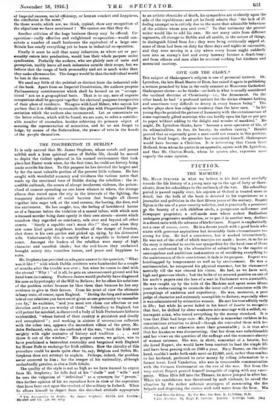THE ELEMENTS OF RECONSTRUCTION.*
THE authors of these essays on the industrial reconstruction which will follow the war have a very pleasant style and splendid aspirations for their country, and they are not hampered by prejudices in cal 'ling their constructive faculties into play. We would say indeed that their judgment would be all the better for some prejudice in favour of the fruits of past experience. Nowadays however we are all ready to consider economic opinions with which we disagreed in the past so long as they be rationally stated—in other words, so long as they attempt to show that moral influences may have a higher directing-power than mere economic law as such. We have no use for the economist who persists in trying to make us believe that two and two make five, or six, or seven. Along that line of argument we are not open to conviction. But if some one tells us that although two and two can never make anything but four mathematically considered, yet industrial problems involve so many subtle human motives, which increase or diminish human energy, that no industrial problem can rightly be regarded as a mathematical problem at all, then we are all attention and are de cidedly open to conviction. Free Traders, we confess, used to take too mathematical a view of our economic problems. Man is a noble animal, and when his resolution is stirred by a worthy cause he can rise superior to economic law lathe sense that a peculiar stimulus (such as an appeal to his pride or his patriotism) may raise his productive power proportionately higher than an economic drag could ever depress it. In some circumstances what mathematically considered ie an economic disadvantage may actually supply the stimulus. If the stimulus be provided its price is generally cheap.
Such a case, we think, has occurred in Germany, where a tariff on imported corn has given the farmer the confident sense that the State is behind him because his industry is regarded as essential to the national safety and well-being. He goes ahead with arable farming, accepting risks because they have, so to speak, ceased to be risks. The wheatgrower enjoys a certain stability of prices. Without that stability British farmers have tended more and more to become grass-farmers, thus diminishing their risks but producing less and less of the essential food of the people which is wheat. The German farmer, we need hardly say, was not stimulated by the mere prospect of making two or three shillings per quarter more than the Free Trade price on his wheat. There is nothing dazzling in that. Rather the tariff justified itself in the circumstances as a token of the settled policy of the Government. The tariff was not a policy in itself—a tariff never is--and one can imagine many cases even in agriculture in which it would be a great disadvantage to a nation as a whole ; but it was an expression of a policy. It supplied a stimulus ; and Germany in becoming agriculturally almost self-supporting has profited as a country much more than she has lost through the increase of the price of food which mathematically may be shown to be the result of a tariff. In any case, whether one assents to this reasoning or not. British agriculture seems to be a " key 's or " pivotal " industry, as the latest fashion in political phrases has it, and must therefore be preserved be the price of preservation high or low. For our part we prefer a bonus to a tariff. But we need not repeat our reasons now. The point is that if, owing to the perils of the seas in war, our food supply from over the seas cannot be guaranteed in future we must make ourselves safe by encouraging the farmer to produce more food at home. It would be the last act of insane economie pedantry to say that we will not pay the price for this because the method of paying offends economic tradition. We have mentioned agriculture first because the writers of these essays give it special attention, and because we take it to be a sort of crux. If men are not prepared to review their economic opinions in relation to agriculture, they are not likely to change them at all.
What the authors chiefly desire for British industry may be briefly described as national trusts. They argue that Socialism is dead in the old sense which imagined that capitalists could all be expropriated and a new order of officials would instantly be at hand to administer the factories and properties for the State. No such order of men exists, and Britain would be ruined while the attempt was being made to create them. The authors therefore propose as the future form of our industries a scheme of "syndication without confiscation." The huge industry, in which working expenses can undoubtedly be reduced to a minimum, is their panacea ; and for the rest they think that the experience of the war justifies them in demanding State direction. To the first half el the proposition we partly agree. The United States supplies us with a million examples of cheap production owing to the scale on which the industries are run and to the prevalence of standardization, which is easy for the large producer and very difficult for the small one. In British agriculture, above all, the total waste is enormous on the small farms where the farmers cannot afford to buy their materials in bulk, or to own their larger agricultural machinery, or to organize the marketing of their produce. The authors relevantly point out that it is absurd to blame British manufacturers for not habitually employing research chemists when the truth is that few manufacturers can afford to subsidize research—their business is not on a large enough scale. Thus in the view of the authors the syndication of industry and the improvement of scientific education are only different aspects of the same problem.
Our criticism of this scheme of national trusts is that in the majority of instances the advantages of the large business may be had without State control ; but the authors seem to assume that State control is a thing to be desired for its own sake. No doubt they have in mind the successful working of the railways under State control and of the con_ trolled munition factories. Certainly these are at present examples of "syndication without confiscation" and of "national trusts " ; the original managers remain at their posts ; the Government are, as it were, official receivers. But it should not be forgotten that we are now at war, and that after a time we shall be at peace. The patriotic motive of the moment which makes for self-suppression, orderliness, and acceleration will no longer exist. The motive of the "Government stroke" will reassert itself. The authors will say that they provide in their scheme for so changing the relation of Labour to Capital that the workers will have an incentive to increase their output instead of restricting it. Even if the answer were valid we should shrink from turning millions of workers into State employees or Civil Servants. The Government would be the plaything of electoral pressure, and what would be the value of State direction then ? The proper aim seems to us to be to confine State intervention or responsibility to the " key " or "pivotal " industries, and even here intervention may be of varying kinds and degrees. State intervention should be regarded not as a thing to be desired, but as a thing that may be necessary. We admit that agriculture is an extreme case, for if the farmers do not produce the food of the people by good farming they are, by the fact that they occupy the land, preventing others from doing it in their stead. In this sense (and not in the sense in which Mr. Lloyd George and his Land Reformers used the word) the land is a "monopoly." Logic leads us on, in the event of any dereliction of their duty by the farmers under individual freedom, to a system under which the State will exact a certain standard of farming. But the authors seem to forget that the motive of the "Government stroke" is deep-rooted in human nature and that it will always thrive on very little encouragement. They say :— "The quasi-nationalized business can confer with the State and with organized labour and scheme a use of labour that will be at once far more profitable to the community and far more acceptable to the worker. For example it seems to be demonstrable that much more can be got out of a man if he works intensely, continually, and hopefully for quite a few years than if he works hopelessly and unwillingly for all his life. Very few private employers can bargain with a man upon the lifetime scale ; but the nationalized industry can. It can pay in that most attractive of all wages, security ; it can guarantee a man's ultimate leisure and independence. The private employer cannot arrange that the worker shall remain under training up to 18 or 20, so increasing his ultimate efficieney; the national employer can. And it is in this direction of the quasinational kindness that our urgent international position, our national welfare and the happiness of the people alike point. Whether we think of Imperial success, social efficiency, or human comfort and happinees, the conclusion is the same."
Do these words, which are, we think, typical, show any recognition of the objections we have mentioned We cannot see that they do.
Another criticism of the huge business theory may be offered. Cooperation—really effective and enlightened co-operation—would constitute a number of small businesses the equivalent of a large oneBritain has nearly everything yet to learn in industrial co-operation.
Finally it must be said that many industries, as where art or peraonality enters into production, would lose their whole purpose under syndication. Probably the authors, who are plainly men of taste and perception, tacitly leave all such industries outside their scope, but we believe that the range of both personality and art is much wider than they make allowance for. The danger would be that the individual would be lost in the ocean.
We need bay little of the political as distinct from the industrial side of the book. Apart from an Imperial Constitution, the authors propose Parliamentary constituencies which shall be formed on an "occupational" not on a geographical basis. That is to say, men of cognate occupotions shall be grouped together for electoral purposes irrespective of their place of residence. Macre° with Lord Milner, who says in his preface that it is difficult to reconcile this plan with Proportional RepressentsAion which the authors also recommend. Let us concentrate on the latter reform, which will be found, we are sure, to solve a considerable number of anomalies, besides achieving its primary object of steeuring the representation of minorities, and let us not forget to lodge, by means of the Referendum, the power of veto in the hands of the -people themselves.













































 Previous page
Previous page